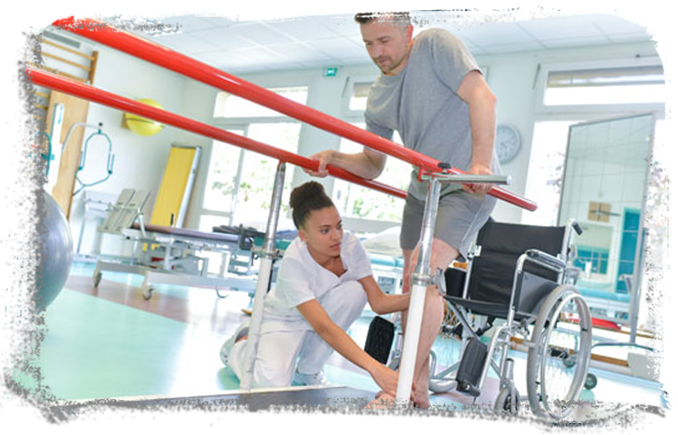HEALTHCARE
Occupational Therapy Assistant
Your journey into the fulfilling world of occupational therapy starts here.

Salary Range Potential:
$55,000+ /YEAR
Education Required:
Community College or Technical Degree
Skills Needed:
Active Listening, Monitoring, Social Perceptiveness, Service Orientation, Critical Thinking
Types of Employers:
Outpatient Physical Therapy Clinics, Nursing Facilities, Hospitals, Rehabilitation Centers, Sports And Fitness Facilities
Job Description
Occupational therapy is the only profession that helps people across the lifespan to do the things they want and need to do through the therapeutic use of daily activities (occupations). Occupational therapy practitioners enable people of all ages to live life to its fullest by helping them promote health, and prevent—or live better with—injury, illness, or disability.

Training Opportunities
20 months ACOTE accredited technical program for training Occupational Therapy Assistants
Pre-requisites required:"The PRCC OTA Program faculties have specified the following nonacademic criteria (technical standards) which all students are expected to meet in order to participate in the OTA Program and professional practice. OBSERVATION: The student must be able to participate actively in all demonstrations, laboratory exercises, and clinical experiences in the professional program component and to assess and comprehend the condition of all patients assigned for examination and treatment. COMMUNICATIONS: The student must be able to communicate effectively and sensitively with patients in order to elicit information; describe changes in mood, activity, and posture; assess non-verbal communications; and be able to effectively and efficiently transmit information to patients, fellow students, faculty and staff and all members of the health care team. MOTOR SKILLS: The student must have sufficient motor function to elicit information from patients by appropriate therapeutic maneuvers; be able to perform basic tests; possess all skills necessary to carry out therapeutic procedures; be able to perform movements required to provide general care and emergency treatment to patients. INTELLECTUAL/CONCEPTUAL INTEGRATIVE AND QUANTITATIVE ABILITIES: The student must be able to measure, calculate reason, analyze, evaluate, and synthesize. Problem solving, a critical skill demanded of all Allied Health Practitioners, requires all of these intellectual abilities. BEHAVIORAL AND SOCIAL ATTRIBUTES: The student must possess the emotional health required for full utilization of the student’s intellectual abilities; the exercise of good judgment, the prompt completion of all responsibilities; attend to care of patients; and the development of a mature, sensitive, and effective relationship with patients. Students must also be able to tolerate taxing workloads, function effectively under stress, adapt to a changing environment, display flexibility, and learn to function in the face of uncertainties inherent in clinical problems of many patients. Compassion, integrity, concern for others, interest, and motivation are personal qualities which each student should possess."
Length of Program:2 years
Summary of Program Requirements:"The PRCC OTA Program faculties have specified the following nonacademic criteria (technical standards) which all students are expected to meet in order to participate in the OTA Program and professional practice. OBSERVATION: The student must be able to participate actively in all demonstrations, laboratory exercises, and clinical experiences in the professional program component and to assess and comprehend the condition of all patients assigned for examination and treatment. COMMUNICATIONS: The student must be able to communicate effectively and sensitively with patients in order to elicit information; describe changes in mood, activity, and posture; assess non-verbal communications; and be able to effectively and efficiently transmit information to patients, fellow students, faculty and staff and all members of the health care team. MOTOR SKILLS: The student must have sufficient motor function to elicit information from patients by appropriate therapeutic maneuvers; be able to perform basic tests; possess all skills necessary to carry out therapeutic procedures; be able to perform movements required to provide general care and emergency treatment to patients. INTELLECTUAL/CONCEPTUAL INTEGRATIVE AND QUANTITATIVE ABILITIES: The student must be able to measure, calculate reason, analyze, evaluate, and synthesize. Problem solving, a critical skill demanded of all Allied Health Practitioners, requires all of these intellectual abilities. BEHAVIORAL AND SOCIAL ATTRIBUTES: The student must possess the emotional health required for full utilization of the student’s intellectual abilities; the exercise of good judgment, the prompt completion of all responsibilities; attend to care of patients; and the development of a mature, sensitive, and effective relationship with patients. Students must also be able to tolerate taxing workloads, function effectively under stress, adapt to a changing environment, display flexibility, and learn to function in the face of uncertainties inherent in clinical problems of many patients. Compassion, integrity, concern for others, interest, and motivation are personal qualities which each student should possess."
Skills NeededCall for more details

Forrest County Center
ContactTim Pulver 601.554.5541tpulver@prcc.edu
Michelle Haynes 601.554.5485mhaynes@prcc.edu